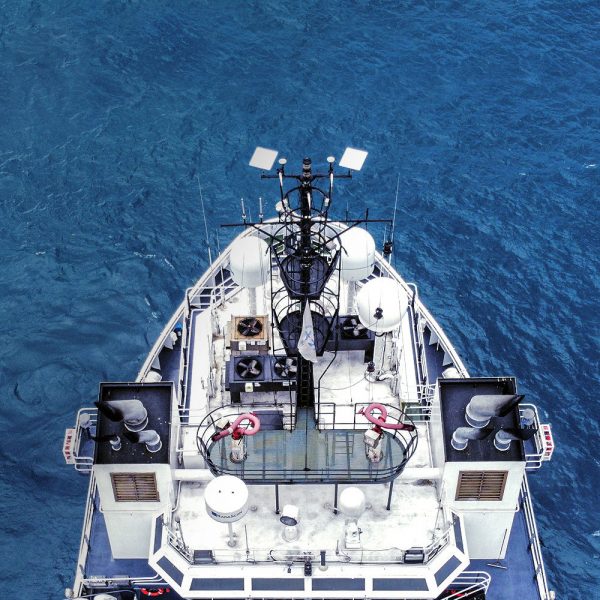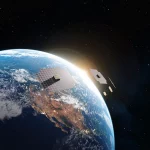Ofcom Improves LEO Satellite Broadband for UK Maritime Use UPDATE

The UK telecoms and media regulator, Ofcom, has today proposed to update their Earth Station Networks (ESN) licence so that the new generation of Non-Geostationary Satellite Orbit (NGSO) platforms (e.g. Starlink and OneWeb) can be used at sea to “deliver improved maritime connectivity.”
Every network operator delivering Fixed Satellite Services (broadband) to UK based satellite terminals must hold an Earth Station Network licence. Existing satellites in a much higher Geostationary Orbit (GSO) are already supported for delivering maritime connectivity, thus Ofcom’s planned licence change will allow NGSO services to access and use spectrum in the same way, while mitigating any risk of undue or harmful interference.
All of this is important because, over the past few years, we’ve seen the emergence of a new generation of Non-Geostationary Satellite Orbit (NGSO) satellites, such as the mega constellations in Low Earth Orbit (LEO – typically around 500-1300km) from OneWeb and Starlink, which can deliver relatively fast latency times (under 100 milliseconds) and ultrafast (100Mbps+) broadband speeds.
Advertisement
Ofcom’s Proposals
a) Authorisation of NGSO maritime earth stations, to clarify that these services are permitted in the territorial seas of the UK, Isle of Man and Channel Islands and so ensure all NGSO services operate under the same licence conditions;
b) New licence conditions to support the protection of GSO satellite services, radio astronomy and fixed links from harmful interference caused by NGSO systems;
c) The addition of a definition of the geographical boundaries of the licence.
The consultation on all this will be open for feedback until 7th July 2023. We should point out that adding official NGSO support for maritime connectivity won’t just result in improved broadband connectivity at sea, since we know that some mobile operators (e.g. EE / BT) are also looking at extending their 4G and 5G coverage using related connectivity on cruise ships etc.
UPDATE 15th Sept 2023
Ofcom has now confirmed these changes.
What we have decided – in brief
After considering all consultation responses we have decided to introduce the following changes to the satellite Earth Station Network licence:
• Inclusion of NGSO maritime earth stations to ensure that all NGSO operators hold an Earth Station Network licence; and to clarify that these services are permitted in the territorial seas of the UK, Isle of Man and Channel Islands;
• New licence conditions to support the protection of GSO satellite services, radio astronomy and fixed links from harmful interference caused by NGSO systems;
• The addition of a definition of the geographical boundaries of the licence.
The new/updated licence will be issued to all new applicants granted an Earth Station Network licence in future. The updated terms will be issued to all existing licence holders in the form of a variation to their current licences.
Mark is a professional technology writer, IT consultant and computer engineer from Dorset (England), he also founded ISPreview in 1999 and enjoys analysing the latest telecoms and broadband developments. Find me on X (Twitter), Mastodon, Facebook, BlueSky, Threads.net and Linkedin.
« CityFibre Start 10Gb XGS-PON Upgrade of UK Broadband Network





















































I guess Starlink have been breaking the law – they have been offering this in the UK for over a year and there are users on reddit who have discussed the Maritime plan and it’s benefits etc
Just the usual situation in the UK, where anything that is controlled by so-called government is at least 2 years behind the times.
wouldn’t it be the users breaking the law not Starlink? And through no fault of their own really I suppose. From the Starlink website itself:
“overage in local territorial waters and in motion for land is contingent on government approval.”
so therefore it would need to be approved by the government, which it would seem on a cursory glance is not. But that’s not Starlink’s fault. You can buy equipment like a Ham radio but you cannot legally use it without a license. Of course I’m sure Ofcom wouldn’t have the first clue if anyone was actually using a VSAT appliance without approval. This is basically just another money-maker for them.
Well they just sent me an e-mail saying I can have 6TB of on wster use between here and American for £9000 a month (and then unlimited after that)
Maybe a great thing for cruise ships.
Crikey, Ofcom control the seas as well as thin air.
Yes, in British waters….